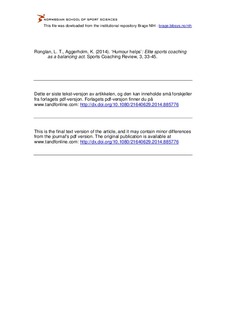‘Humour helps’: elite sports coaching as a balancing act
| dc.contributor.author | Ronglan, Lars Tore | |
| dc.contributor.author | Aggerholm, Kenneth | |
| dc.date.accessioned | 2015-08-06T10:16:56Z | |
| dc.date.available | 2015-08-06T10:16:56Z | |
| dc.date.issued | 2014-02-28 | |
| dc.identifier.citation | Sports Coaching Review. 2014, 3, 33-45 | nb_NO |
| dc.identifier.uri | http://hdl.handle.net/11250/295161 | |
| dc.description | I Brage finner du siste tekst-versjon av artikkelen, og den kan inneholde ubetydelige forskjeller fra forlagets pdf-versjon. Forlagets pdf-versjon finner du på www.tandfonline.com: http://dx.doi.org/10.1080/21640629.2014.885776 / In Brage you'll find the final text version of the article, and it may contain insignificant differences from the journal's pdf version. The definitive version is available at www.tandfonline.com: http://dx.doi.org/10.1080/21640629.2014.885776 | nb_NO |
| dc.description.abstract | To date, humour's role in sport settings has hardly received scholarly attention. However, reflecting on future research within the sociology of sports coaching (Jones, Ronglan, Potrac, & Cushion, 2011), it was suggested that ‘the multi-functional use of humour, its intent, manifestation, and effect within the often emotionally-charged world of coaching, would appear to hold very interesting possibilities’ (p. 185). This formed the point of departure for the work presented in this paper. The study focuses on how coaches interpret the appearance of humour in the context they operate, and how they apply it as an integrated part of their coaching performances. In-depth interviews with six experienced elite Scandinavian sport coaches formed the empirical basis for the analysis. Based on Erving Goffman's sociology of social interaction, the data were analysed and discussed in relation to three main categories: humour's significance in the elite sport context, humour and group dynamics, and the performance of the coach. The analysis demonstrates that ‘humorous coaching’ can be seen as a balancing act between the inherent tensions of ‘seriousness and fun’, ‘distance and closeness’, and ‘authenticity and performance’. | nb_NO |
| dc.language.iso | eng | nb_NO |
| dc.publisher | Taylor & Francis | nb_NO |
| dc.subject | coaching performances | nb_NO |
| dc.subject | humour | nb_NO |
| dc.subject | social roles | nb_NO |
| dc.subject | interaction | nb_NO |
| dc.subject | impression management | nb_NO |
| dc.title | ‘Humour helps’: elite sports coaching as a balancing act | nb_NO |
| dc.type | Journal article | nb_NO |
| dc.type | Peer reviewed | nb_NO |
| dc.subject.nsi | VDP::Social science: 200::Social science in sports: 330 | nb_NO |
| dc.source.journal | Sports Coaching Review | nb_NO |
| dc.description.localcode | Seksjon for coaching og psykologi / Department of Coaching and Psychology | nb_NO |
Tilhørende fil(er)
Denne innførselen finnes i følgende samling(er)
-
Artikler / Articles [2119]
